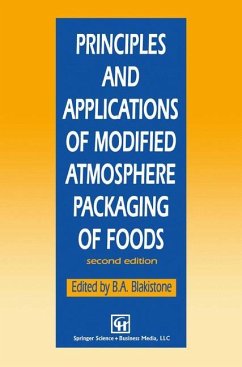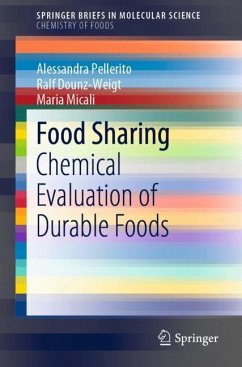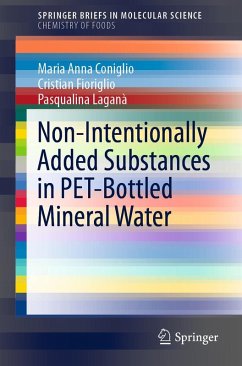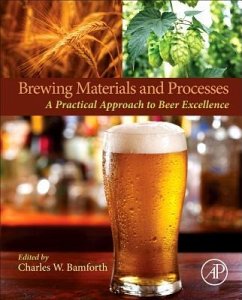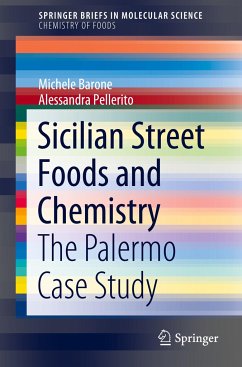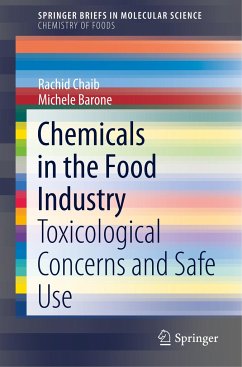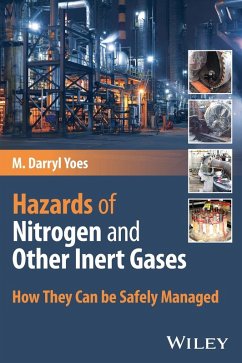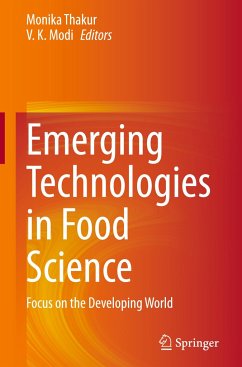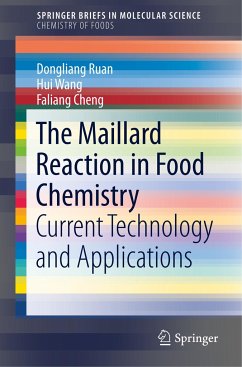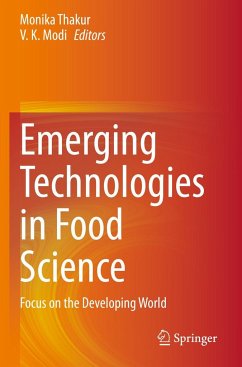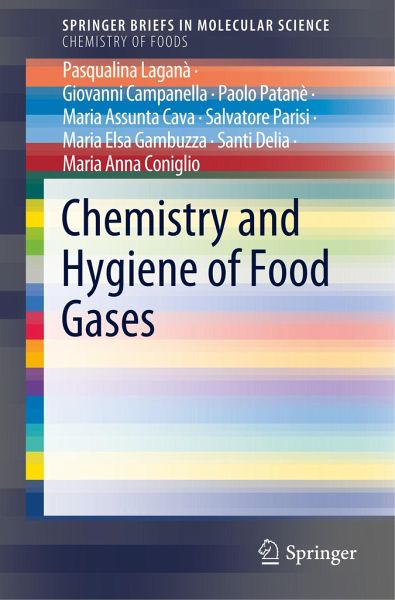
Chemistry and Hygiene of Food Gases
Versandkostenfrei!
Versandfertig in 1-2 Wochen
Weitere Ausgaben:

PAYBACK Punkte
20 °P sammeln!




This book focuses on the use of food gases in the food industry, their different applications and their role in food processing, packaging and transportation. Since these gases come into contact with food, they must comply with strict of labeling, purity and hygiene standards in order to ensure food safety.The book discusses various implications of food gases in the food chain, providing examples of how they can be used to limit food waste and losses. The first two chapters examine the classification and role of food gases in Europe, and the third chapter then explores the chemical and physica...
This book focuses on the use of food gases in the food industry, their different applications and their role in food processing, packaging and transportation. Since these gases come into contact with food, they must comply with strict of labeling, purity and hygiene standards in order to ensure food safety.
The book discusses various implications of food gases in the food chain, providing examples of how they can be used to limit food waste and losses. The first two chapters examine the classification and role of food gases in Europe, and the third chapter then explores the chemical and physical features of commonly used food gases in the food and food packing industries. The fourth chapter highlights the impact of food gases on human health due to their possible abuse and misuse. This book appeals to researchers and professionals working in food production and quality control.
The book discusses various implications of food gases in the food chain, providing examples of how they can be used to limit food waste and losses. The first two chapters examine the classification and role of food gases in Europe, and the third chapter then explores the chemical and physical features of commonly used food gases in the food and food packing industries. The fourth chapter highlights the impact of food gases on human health due to their possible abuse and misuse. This book appeals to researchers and professionals working in food production and quality control.
Pasqualina Laganà is a Biologist with a MSc from the University of Messina, Italy, and specialisations in General Pathology (1992) and Chemistry and Food Technologies (2000). Graduated in 'Risks and disorders in the Work' (1998) and in 'Parasitology of Territory' (2009), she has also obtained in 2013 a Master in 'Epidemiology and Biostatistics' (Università Cattolica del Sacro Cuore, Rome, Italy). Since 1996 she has been Adjunct Professor of General and Applied Hygiene, and Researcher at the Faculty of Medicine and Surgery at the University of Messina. Member of the Italian Society of Hygiene, Preventive Medicine and Public Health (S.It.I.), and the Italian Study Group Hospital Hygiene and Italian Foods Group. Member of the Sicilian Commission for the application of Legionella Guidelines since 2011, she is also the Responsible of Analysis within the Regional Reference Laboratory for clinical and environmental Legionella Surveillance (branch of Messina, Sicily) since 2012, and the Head of the Laboratory from October 2016 onwards. She is a member of the Editorial Board of several Journals, including the Journal of Clinical Microbiology and Biochemical Technology (JCMBT), Zeszyty Naukowe (Gdynia Maritime University, Poland), Global Drugs and Therapeutics (GDT) and EC Microbiology (ECMI). She is also a Referee for various international scientific journals and the author of 80 publications indexed in Medline and other databases. Giovanni Campanella is graduated in Medicine and Surgery at the University of Messina (2011). He became a specialist in Hygiene and Preventive Medicine (2018). He is Member of the Italian Society of Hygiene, Preventive Medicine and Public Health (S.It.I.). During post-graduate School in Hygiene and Preventive Medicine he attended the Food Hygiene Laboratory and the Regional Laboratory for Environmental and Clinical Surveillance of the Legionella at the 'AOU G Martino' hospital in Messina. Currently he works at the Primary Care Department at the Health Protection Agency in Brescia. Paolo Patanè is graduated in law, with top marks, from the University of Messina, Italy, and he has obtained an M.Sc. in Innovation and Development of Intellectual Property in Rome. After the successful Italian state examination to become a lawyer, Dr. Patanè has worked as consultant for legal and administrative aspects of the Sicilian Regional Authority, being in charge of Management EU funds in the Operating Regional Programme 'POR Sicilia 2000-2006'. He was also General Secretary of the Faculty of Medicine and Surgery at the University of Messina (2007-2013). After a short period at the Department of Clinical and Experimental Medicine (2013-2015), he is now the Head of the Office of the University of Messina, and responsible for protecting the Intellectual Property Rights of the inventions from the university staff. He has also been a Universitycontract professor (2013/2014 and 2014/2015) at the Messina University, and a lecturer in 2015 and 2016 at several workshops about Intellectual Property Rights. Dr. Patanè has also published several issues about law, alone: 'Authority', 'Ombudsman', 'Spoils System', 'Prisoners population in Italy', and in collaboration with other authors, such as: 'Chemistry and Hygine of food additives', 'Polyphenols and Functional Foods from the Regulatory Viewpoint'. Maria Assunta Cava has a diploma in 'Technician of Biology-Chemistry Laboratory' granted in Cosenza (Italy) and a certificate of qualification as 'Health Assistant' (OSS) granted in Perugia (Italy). Among other activities related to the field of health, she has completed an internship at the Cosenza Hospital 'Annunziata' in Internal Medicine and Surgery departments. She has completed also an internship in the Centralized Clinical Laboratory of the 'Piemonte' Hospital in Messina (Italy). After a period as Health Assistant at Santa Maria della Misericordia University Hospital (Udine, Italy) in the Heart and Thoracic Surgery department, she moved to the Polyclinic of Verona (Italy), and subsequently to the Bianchi-Melacrino-Morelli Hospital (Reggio Calabria, Italy). At present, She is health assistant at Pugliese-Ciaccio Hospital - Emergency Room and registration desk Department (Catanzaro, (Italy). Dr Cava has training in fields relating to medicine, such as Basic Life Support and Defibrillation (BLSD), Hazard Analysis and Control of Critical Points (HACCP), (Prehospital Trauma Care (PTC), Hazards and Safety in workplaces, Prevention and protection in handling of loads. Salvatore Parisi obtained his MSc from the University of Palermo, and PhD from the University of Messina, Italy. Between 1994 and 2010, Dr Parisi has been involved in different chemical activities working and travelling in different countries around the world, including the United Kingdom and United States of America. Prof Parisi serves as series editor for the SpringerBriefs in Molecular Science: Chemistry of Foods. Moreover, He has recently joined the AOAC Official Methods Board (OMB), being also present in different AOAC Working Groups and Expert Review Panels since 2015. He has also recently received the 2019 AOAC Expert Review Panel of The Year with the ERP for SPIFAN MCPD Methods. In addition, Prof. Parisi has served as Special Guest Editor for the Journal of AOAC International in 2018 and in 2019 with three Special Sections concerning antibiotics, antimicrobials, and polyphenols in foods. He is Visiting Assistant Professor at Al Balqa Applied University, Jordan. Prof Parisi also works actively with the Associazione 'Componiamo il Futuro' (COIF), Palermo, Italy. Dr. Maria Elsa Gambuzza is a Control Authority of the Italian Ministry of Health since 1988. She has a degree in Biology (1988), a post-lauream specialization in Microbiology and Virology (1992), a Master in Environmental Parassitology (1990) in addition to PhD in 'Microbial Biothecnologies', 'Neurosciences' and 'Occupational Medicine', all obtained at University of Messina, Italy. The main working activities are related to the International Profilaxis in marine and air transports and the control of emerging infectious diseases, in accordance with the Health International Regulation of 2005. She has also a good knowledge of bioinformatics, especially related to computational analysis of amino acid sequences of antibody molecules and 'Antibody modeling', for identification of the three-dimensional structure of the combining site for the relevant antigens. In the years 2010-2014 she was adjunct Professor of Clinical Microbiology at Degree Course of Biotechnology, of Veterinary Microbiology at Degree Course of Biotechnology, and of Microbiology at Degree Course of Pharmacy (University of Messina, Italy). Since 2016, she is Italian Control Authority for contained and deliberate use of Genetically Modified Microrganisms (GMMs). She is editorial board member for Austin Publishing Group: Journal of Multiple sclerosis and Neuroimmunology. She was also Editor in Sanitary Research of Ministry of Health 2017-2018 (Sanitary Research) in 2015 and 2019. Santi Delia is a full professor of Hygiene at University of Messina, Italy. After an initial scholarship in 1974, he was appointed assistant at the same Institute of Hygiene since 1976. From 1989 to 2007 he worked at the Healthcare Management of University Hospital in Messina taking care of the Hygienic issues. During this period he was the Coordinator of the Commission Nosocomial Infections Operative Group and Chairman of the Commission Surveillance for Food Arrangements, and the responsible for two official teachings in the Degree Course of Medicine and Surgery.Also, he lectured different Postgraduate Schools and degree Courses. Professor Delia was the Director of the Master course in 'Food Hygiene and Food Legislation' and the Coordinator of three cycles of PhD School in 'Applied Hygiene'. He was also the Director of the Department of Hygiene, Preventive Medicine and Public Health 'R. De Blasi' (University of Messina), the Director of the Food Laboratory and of Regional Reference Laboratory for Environmental and Clinical Surveillance of Legionellosis until September 2016. Professor Delia has taken part in numerous conventions, conferences, roundtables, advanced training courses, as a speaker and/or moderator. His scientific activity is documented with more than 150 scientific articles, books and book chapters. Maria Anna Coniglio is a Medical Doctor graduated from the University of Catania in 1998 and specialized in Hygiene and Preventive Medicine at the University of Catania in 2002, where she started her research activity in the fields of health promotion and epidemiology of infectious and non infectious diseases. In 2003, she became Researcher of Hygiene and Preventive Medicine at the University of Catania. In 2005, she became Aggregate Professor at the same University. Member of the Sicilian Commission for the application of Legionella Guidelines since 2011, she is the Director of the Regional Reference Laboratory for Clinical and Environmental Legionella Surveillance (branch of Catania, Sicily) since 2012. In collaboration with the Local Health Unit she has organized several training courses related to the field of health promotion. She has taken part as a speaker in many scientific national and international congresses. She has published several papers in national and international journals in the field of health promotion, epidemiology and prevention of the infectious and non infectious diseases.
Produktdetails
- SpringerBriefs in Molecular Science
- Verlag: Springer / Springer International Publishing / Springer, Berlin
- Artikelnr. des Verlages: 978-3-030-35227-1
- 1st edition 2019
- Seitenzahl: 56
- Erscheinungstermin: 15. Januar 2020
- Englisch
- Abmessung: 235mm x 155mm x 4mm
- Gewicht: 110g
- ISBN-13: 9783030352271
- ISBN-10: 3030352277
- Artikelnr.: 57904753
Herstellerkennzeichnung
Springer Nature c/o IBS
Benzstrasse 21
48619 Heek
Tanja.Keller@springer.com
Für dieses Produkt wurde noch keine Bewertung abgegeben. Wir würden uns sehr freuen, wenn du die erste Bewertung schreibst!
Eine Bewertung schreiben
Eine Bewertung schreiben
Andere Kunden interessierten sich für




